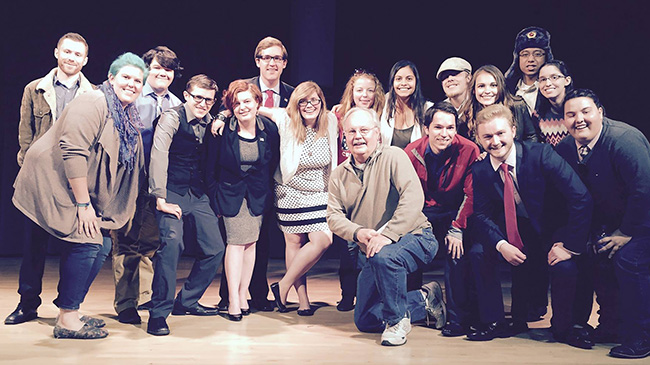By Steven Krolak
It’s one thing to have opinions about the war in Syria or Chinese expansion. But what if you sat on the United Nations Security Council as the representative of one of the member states? How would you choose to vote on matters that directly involved your country’s national interest as well as its global conscience?
Last week 16 IU Southeast students grappled with issues such as Syria and China, as well as Israeli settlements and settler violence against Palestinians, the ongoing conflict in Yemen and other challenges at the 37th annual model U.N. Security Council conference at the University of Evansville in Evansville, Ind., organized by the Indiana Consortium for International Programs (ICIP).
Two teams or councils from IU Southeast won awards for Best Delegation: Zach Crozier and Amanda Miles (representing the United States) and Brandon Hoffman and April Stiller (representing Chile).
Hoffman was also selected best delegate overall, while Crozier received second-place honors in the category and Roger Howard (representing Jordan) received third-place honors.
The competition brought together 56 students from four universities, including the University of Louisville, University of Evansville, University of Indianapolis and IU Southeast.

Students of the IU Southeast Model United Nations Security Council team, with Prof. Cliff Staten.
Dr. Cliff Staten, professor of political science and international studies, and faculty adviser to the IU Southeast team, participated in his first model U.N. in 1968 as a ninth grader, and has been passionate about it ever since. He has directed and organized the event for the ICIP for over a decade. He said the competition is a complete teaching tool, building skills in research, public speaking, writing, parliamentary procedure, the ability to move a group toward consensus, and the ability to think on one’s feet.
“These basic skills are necessary for virtually anything you do for the rest of your life,” Staten said.
At IU Southeast, the model U.N. is extracurricular, and attracts students from history, political science, business, economics, education and other disciplines. Once the teams are formed, students are on their own to organize their time and prepare themselves for the event. At the model U.N. itself, the students are “running the show,” according to Staten. “It’s not your typical classroom,” he said. “It’s a public thing. If you’re not prepared, everyone will know it.”
Winners are determined by a vote of peers, based on knowledge of the issues, accurate role playing, the ability to bring people together and move to consensus, public speaking and other criteria.
Stiller, a Spanish and international studies major from Floyds Knobs, Ind., said the amount of information on the five topics seemed overwhelming at first. But after weeks of research and major library time, she and Hoffman gained significant expertise, and were able to produce draft resolutions that were then presented, debated, amended and voted on at the conference.
“I have become a more knowledgeable student in regards to global issues and the reasons why passing resolutions at the U.N. is a difficult task,” Stiller said. “Not only do you have to accurately represent what your country believes, even if you do not personally believe it, but you have to find ways to make sure other countries support you.”
Miles, a double-major in Spanish and criminal justice from Georgetown, Ind., represented the U.S. She also gained an understanding of the complexities, frustrations, and realities of the political process. “We would spend hours debating one topic, finally get to a resolution, and then it wouldn’t pass,” she said. “But I also learned that a lot takes place behind the scenes, during unmoderated caucusing, and that’s when you can really get things done.”
Other participants from IU Southeast included: Alex Yson and Kat Faulkner (Russia), Jazmin Oliver and Aspen Kirchgessner (Spain), Ryan Houchin and Dakota Porter (Venezuela), Trevor Allen and Clayton Greenwell (United Kingdom), Ashley Smith (Jordan), Hannah Volmer and Kailey Coursey (Malaysia).
“All of these students performed extremely well and were a credit to IU Southeast,” said Staten. “I am so proud of everyone, as the model U.N. is very intense and competitive.”
Hoffman, a Louisville, Ky. native and political science major with minors in international studies and writing, said, “This experience has given me so much and helped me improve any skills I may already have in critical thinking, professionalism, public speaking, debate, conflict resolution, management, and many more.”
“I feel like I have become a much better U.S. citizen who is aware of the world around me,” said Stiller. “This experience has changed my outlook on the world, and confirmed my desire to give back to the global community.”
The Indiana Consortium for International Programs (ICIP) is a group of 12 colleges and universities in Indiana and Kentucky devoted to the development of the international dimension of its member institutions. ICIP works to improve faculty competence, encourage greater student achievement and awareness, develop curriculum, and provide services to assist member institutions in their individual international programs.


